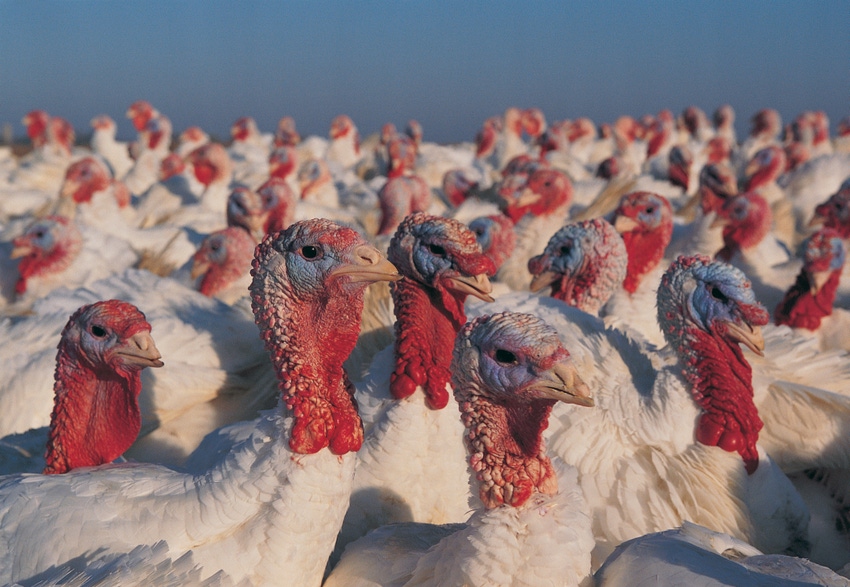South Carolina releases avian flu control area
The originally infected turkey farm remains under quarantine.
May 4, 2020

Clemson University Livestock Poultry Health (LPH) announced May 4 it has released the control area surrounding a Chesterfield County, S.C., turkey farm that was struck in April with a highly pathogenic avian influenza (HPAI) virus.
Movement of poultry and poultry products had been restricted into and out of farms in the 10-km (6.2-mile) control area when the virus was discovered, LPH said. Since the affected flock was depopulated, tests of all commercial poultry flocks in the area have showed no trace of the virus, according to Boyd Parr, LPH director and state veterinarian.
No avian influenza control areas or surveillance zones currently remain active in South Carolina, he said.
The avian flu is not related to the COVID-19 virus and was no immediate human health concern. However, the HPAI virus can cause sudden death in poultry, which generate billions of dollars annually in South Carolina.
“This release follows four rounds of testing during the time starting with detection in the infected flock until 21 days following completion of depopulation of that flock with no further detection of HPAI or LPAI (low pathogenic avian influenza) in any of these flocks,” Parr said. “This is very welcome news for everyone associated with the poultry industry.”
The originally infected turkey farm remains under quarantine. Cleaning of the barns has already begun and the disinfection is expected to be completed during the week of May 4 subject to approval of the cleaning procedures, he said.
“That milestone will start the 90-day countdown for the United States to be eligible to return to HPAI free status by World Organization for Animal Health,” Parr said. “It’s an important step forward for both our poultry industry and our international trading partners.”
Parr credited the parties involved — from farmers and industry to state and federal agencies — for a rapid response to deal with the disease. “The North Carolina state veterinarian with the North Carolina Department of Agriculture & Consumer Services provided invaluable assistance to us as well as the U.S. Department of Agriculture,” he said.
The HPAI infection follows the discovery of LPAI after routine testing in March on three turkey farms in North Carolina’s Union and Anson counties. At that time, surveillance zones were created surrounding each infected farm.
One of those zones extended into Chesterfield County, S.C., where a single commercial turkey farm was identified as a presumptive positive for H7 LPAI by Clemson’s Veterinary Diagnostic Center on March 14.
USDA’s Animal & Plant Health Inspection Service said it appears the virus in South Carolina — an H7N3 strain of HPAI — mutated from the low-pathogenic strain within just one of the barns on the infected farm.
Parr said wild waterfowl were the likely original LPAI source based on USDA’s analysis of the genetic makeup of the H7N3 virus isolated.
In an effort to protect other farms from a possible spread, the LPAI-infected turkey flocks in both states were humanely destroyed. USDA indemnified farmers for the turkeys and some other costs associated with the depopulation, disposal and disinfection, LPH said.
Further testing within 10 km of the Chesterfield turkey farm showed no additional signs of LPAI and there were no reports of increased mortality of respiratory symptoms in any of the affected flocks until the highly pathogenic virus was discovered in early April at a nearby farm that was outside the original surveillance zone, LPH explained.
This was the first case of HPAI strain in the commercial poultry industry since a 2017 outbreak in Tennessee. In a severe HPAI outbreak in 2015, 50 million birds either died of the virus or were destroyed to stop the spread of the disease. These birds accounted for about 12% of the U.S. table-egg laying population and 8% of the nation’s turkeys grown for meat, according to the USDA Economic Research Service.
Avian influenza is caused by an influenza type A virus that can infect poultry — such as chickens, turkeys, pheasants, quail, domestic ducks, geese and guinea fowl — and is carried by free-flying waterfowl such as ducks, geese and shorebirds.
LPH, a South Carolina regulatory agency, is part of Clemson University’s Public Service & Agriculture unit and has a mission to protect animal health by controlling endemic, foreign and emerging diseases in livestock and poultry and to protect the health of South Carolina consumers by inspecting meat and poultry products to ensure they are safe, wholesome and accurately labeled.
You May Also Like



